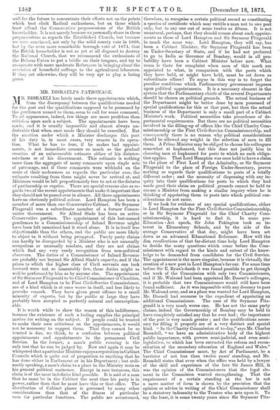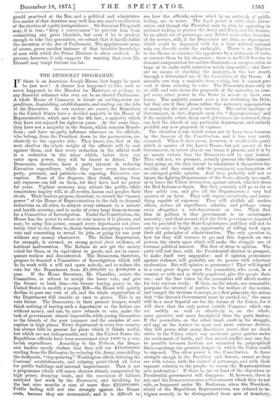MR. DISRAELI'S PATRONAGE.
1UR. DISRAELI has lately made three appointments which, ktl_ from the discrepancy between the qualifications needed for the post and the qualifications supposed to be possessed by the gentlemen named to them, seem to call for some comment. To all appearance, indeed, few things are more profitless than criticism upon such a subject. The appointments have been made, and it is usually impossible and almost always un- desirable that when once made they should be cancelled. But the sanction under which a Minister discharges this part of his duty is, in most cases, very remote in its opera- tion. What he has to fear, if he makes bad appoint- ments, is not immediate censure so much as the gradual creation of an unfavourable estimate either of his disinter- estedness or of his discernment. This estimate is nothing more than the aggregate of many comments upon single acts of patronage, and if these comments were withheld on the score of their uselessness as regards the particular case, the estimate resulting from them might never be arrived at, and Ministers would be left proportionately free to act at the dictates of partisanship or caprice. There are special reasons also as re- gards two of the recent appointments that make it important that they should not be passed over in silence. All three appointments have an obviously political colour. Lord Hampton has been a member of more than one Conservative Cabinet. Sir Seymour Fitzgerald was a subordinate member of a former Conser- vative Government. Sir Alfred Slade has been an active Conservative partisan. The appointment of this last-named gentleman to a Commissionership of Inland Revenue might have been left unnoticed had it stood alone. It is in itself less objectionable than the others, and the public are more likely to object to it without being prompted. Purely party claims can hardly be disregarded by a Minister who is not unusually scrupulous or unusually resolute, and they are not claims which find any very ready recognition from non-political observers. The duties of a Commissioner of Inland Revenue are probably not beyond Sir Alfred Slade's capacity, and if the prizes to which the higher class of Civil servants can look forward were not so lamentably few, these duties might as well be performed by him as by anyone else. The appointment of Sir Seymour Fitzgerald to be Chief Commissioner of Charities, and of Lord Hampton to be First Civil-Service Commissioner, are of a kind which is at once worse in itself, and less likely to provoke remark. They have given great offence to a small minority of experts, but by the public at large they have probably been accepted as perfectly natural and unexception- able.
It is worth while to show the reason of this indifference, because the existence of such a feeling supplies the principal motive for writing on the subject. If people could be trusted to make their own criticisms on the appointments, it would not be necessary to suggest them. That they cannot be so trusted is due, we think, to a confusion between political appointments and appointments in the permanent Civil Service. In the former, a man's public running is the only test that he can be judged by. Now and again it may be whispered that aparticular Minister enjoys a reputation in Cabinet Councils which is quite out of proportion to anything that he has done either in Parliament or in his Department ; but ordi- narily speaking, a man's claim to a place in the Ministry rests on his general political eminence. Except in rare instances, this claim is of the most indefinite kind possible. It is said of a man that he must be in the Cabinet the next time his party is in power, rather than that he must have this or that office. The distribution of Cabinet places is governed by many other considerations than that of the fitness of particular men for particular functions. The public are accustomed,
therefore, to recognise a certain political record as constituting a species of certificate which may entitle a man not to one post only, but to any one out of some twelve or fifteen. It is not unnatural, perhaps, that they should reason about such appoint- ments as those of Lord Hampton and Sir Seymour Fitzgerald in much the same way. Lord Hampton, they will say, has been a Cabinet Minister, Sir Seymour Fitzgerald has been an Under-Secretary of State, and if he had not preferred to go to India as Governor of Bombay, would in all pro- bability have been a Cabinet Minister before now. What room is there for complaint when men of this mark are appointed to what, in comparison with the posts which they have held, or might have held, must be set down as subordinate offices l To argue in this way is to forget the peculiar conditions which Parliamentary government imposes upon political appointments. It is a necessary element in the system that the Parliamentary chiefs of the several Departments should be chosen on political grounds. The actual business of the Department might be better done by men possessed of special qualifications for this or that post, but then the actual business of the Department is only a small part of a Cabinet Minister's work. Political necessities take precedence of de- partmental requirements. But there are no political necessities involved in the filling-up of offices like the Chief Charity Com- missionership or the First Civil-Service Commissionership, and consequently there is no reason why political considerations should be allowed any weight in the selection of men to fill them. A Prime Minister may be obliged to choose his colleagues somewhat at haphazard, but this does not justify him in choosing men at haphazard for posts to which no such obliga- tion applies. That Lord Hampton was once held to have a claim to the place of First Lord of the Admiralty, or Sir Seymour Fitzgerald to the place of Foreign Under-Secretary, proves nothing as regards their qualifications to posts of a totally different order ; and the necessity of dispensing with any in- quiry into their qualifications for posts to which they had made good their claim on political grounds cannot be held to excuse a Minister from making a similar inquiry when he is thinking of appointing them to posts into which political con- siderations do not enter.
If we look for evidence of any special qualifications, either in Lord Hampton for the First Civil-Service Commissionership, or in Sir Seymour Fitzgerald for the Chief Charity Com-
missionership, it is hard to find it. In some pre- Education -Act epoch, Sir John Pakington took an in- terest in Elementary Schools, and by the side of the average Conservative of that day, might have been set down as an advanced Educational Reformer. How will the dim recollections of that far-distant time help Lord Hampton to decide the many questions which come before the Com- missioners with regard to the kinds and extent of the know- ledge to be demanded from candidates for the Civil Service, The appointment is the more singular, because it is virtually the creation of a new post in Lord Hampton's favour. For some time before Sir E. Ryan's death it was found possible to get through the work of the Commission with only two Commissioners, and if Mr. Walrond had been appointed Mr. Dasent's colleague, it is probable that two Commissioners would still have been found sufficient. As it was impossible with any decency to pass Mr. Walrond over, and as a place was wanted for Lord Hampton, Mr. Disraeli had recourse to the expedient of appointing an additional Commissioner. The case of Sir Seymour Fitz- gerald is a very much worse one. He has not the same party claims, indeed the Governorship of Bombay may be held to have completely satisfied any that he ever had ; the importance of the post is very much greater ; and the qualifications neces- sary for filling it properly are of a very distinct and special kind. " In the Charity Commission of to-day," says Mr. Charles Roundell, " we have an administrative body of the highest public importance, with powers semi-judicial, and even semi- legislative, to which has been entrusted the reform and recon- stitution of the secondary education of England and Wales." The Chief Commissioner must, by Act of Parliament, be a barrister of not less than twelve years' standing, and Mr. Roundell states that even when the office was held by a lawyer of the skill and experience of the late Sir James Hill, it was the opinion of the Commissioners that the legal ele- ment in the Commision wanted strengthening. That the requirement of a certain standing at the bar is not a mere matter of form is shown by the provision that the opinion or advice in writing of the Chief Commissioner shall be a statutory indemnity to the Trustee who acts upon it. To say the least, it is some twenty years since Sir Seymour Fitz-
gerald practised at the Bar, and a political and administra- tive career of that duration may well dim any man's recollection of the niceties of equity. jurisprudence. Sir Seymour Fitzgerald may, it is true, "keep a conveyancer" to prevent him from committing any gross blunders, but even if he is prudent enough to take this precaution, we submit that it hardly fulfils the intention of the Act of Parliament. The appointment may, of course, prove another instance of that intuitive knowledge ' of men with which the Prime Minister is often credited. At present, however, it only suggests the warning that even Mr. Disraeli may tempt fortune too far.







































 Previous page
Previous page